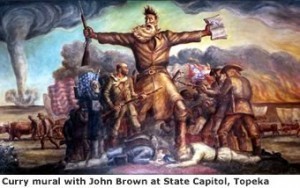Jeff Barnes Says Custer Was Not A Bad General

Jeff Barnes
Hi Jeff Barnes: I’m impressed. You’ve not only written three books–on Custer, Buffalo Bill and High Plains’ U.S. Army forts–you’re a fifth generation Nebraskan and based your entire career on your native state (which is rare in modern day America). You were a reporter and editor, among other things, and are now a freelance writer and historical speaker.
I’m dying to know about Custer.
Q. Why did you write a book about the most written-about general in American
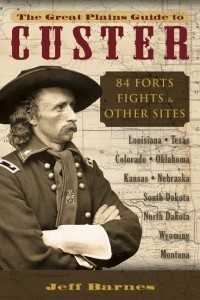 history?
history?A. My Custer book started as “Forts of the Southern Plains,” a follow-up to my first book about the Northern Plains forts. I attended an OIW conference in San Antonio while also doing some research on the forts down there, and Robert Utley was the keynote speaker. One of the bits of knowledge he shared was “If you want success as a writer, write about people who people know.”
On the long drive home, it occurred to me that Custer had visited many of the forts I was researching; I’d also be able to include his battles and other sites on the plains and get into more of the personality aspects. There were many books out there about Custer, but no one had done a historical travel guide so that would be my hook.
Finally, it allowed me to speak about his time in Nebraska and have speaking opportunities here – I couldn’t have done that with a southern-plains fort book.
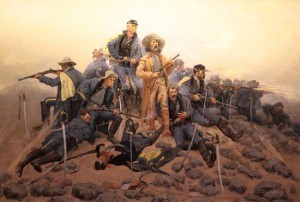 Q. Many people believe Custer was a psychopath and a disastrous general. You don’t seem to feel the same way.
Q. Many people believe Custer was a psychopath and a disastrous general. You don’t seem to feel the same way.A. Unfortunately, many folks draw their history from popular culture or the biased opinions of others. My own cousin – when I told her I was writing a book about him – said “I hate Custer,” and I know she hadn’t cracked a history book in more than forty years!
He certainly wasn’t a psychopath – the Army didn’t keep those commanders in the field.
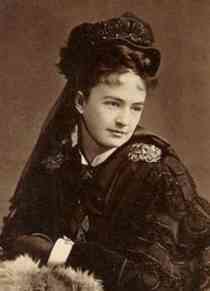
Libbie Custer in her mourning clothes.
(Gen.) Ranald Mackenzie was probably the most successful commander of the Indian Wars and he was retired quickly enough when he showed signs of his deteriorating mental condition.
I wouldn’t call Custer disastrous, either – he had had success on the plains and Sheridan and Sherman fervently wanted him on the 1876 campaign. He came into a disastrous situation, but it wasn’t one of his making.
I don’t know if ANY Army commander active at the time could have found success at Little Bighorn, but I do think Custer had the best chance of it.
Q. Are people ever surprised you don’t believe Custer was a bad general?
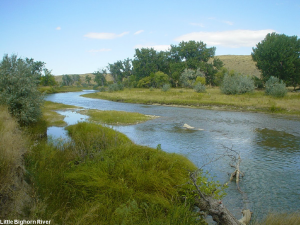
The Little Big Horn River
A. No, or they wouldn’t if they stuck around to discuss him with me! Quite often people will make a short declarative statement – “Custer was a coward!” or “Custer was an idiot!” or “Custer shouldn’t have split his troops!” – but they leave quickly if I ask them why they believe that, or if I offer a counterpoint.
People do not like their beliefs challenged, and I’ve become a pretty good “devil’s advocate” for him.
I wouldn’t call myself a huge Custer fan. If you read The Great Plains Guide to Custer, you’ll see that I present his flaws as well as his virtues – I try to present him honestly and without bias.
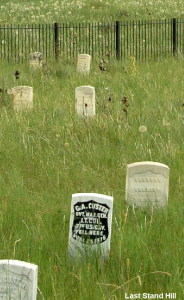
The spot Custer fell.
I was a newspaper reporter of the “old school,” meaning I didn’t approach a story with an agenda – I sought out both sides, presented the facts, and let the reader decide for himself. The book is kind of my attempt to understand Custer, rather than an effort to get the reader to see him the same way I do.
There are things I admire about him, and things I don’t, but Custer is fascinating and deserving of study.
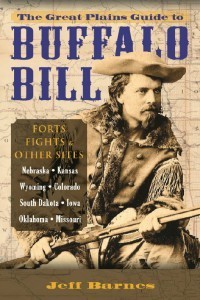 Q. Why did you write about Buffalo Bill Cody?
Q. Why did you write about Buffalo Bill Cody?(Readers, Cody was born near LeClaire in Scott County, Iowa in 1846 and lived until 1917. He was only 14 when he began riding for the Pony Express. He fought for the Union in the Civil War, then worked as a scout for the Army. Thanks to dime novels written by authors like Ned Buntline, Buffalo Bill was already an Old West legend before mounting his famous Wild West show, which traveled the United States and Europe. He earned his name by killing an amazing number of buffalo).
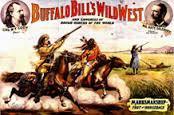 A. I enjoyed getting into a larger-than-life character with George Custer and adapting him to a historical travel guide, and Buffalo Bill Cody offered all of that again. Plus, his ties to Nebraska were even stronger, with his Medal of Honor, his founding of the Wild West show, and his establishment as a true American legend.
A. I enjoyed getting into a larger-than-life character with George Custer and adapting him to a historical travel guide, and Buffalo Bill Cody offered all of that again. Plus, his ties to Nebraska were even stronger, with his Medal of Honor, his founding of the Wild West show, and his establishment as a true American legend.Q. What is the most interesting fact about Buffalo Bill?
A. He was the most famous man in the world at the end of the 19th century – you could mention his name or show his photo and virtually everyone knew who he was. He went from being a long-haired army scout to become the world’s first superstar. He did it in less than 15 years, from Nebraska, and that is truly amazing.
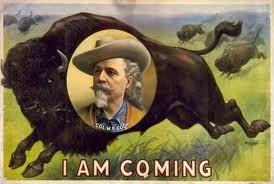
Buffalo Bill poster advertising his show.
Q. There are many stories about Buffalo Bill killing Yellow Hair (a Cheyenne). Did it really happen, and if it did, what exactly happened?
A. Cody and several others were on the hill overlooking the scene when the first Indians from the Red Cloud Agency appeared. Cody and five or six others rode out to intercept the leaders. A signalman watching this with aid of a telescope said the two groups seemed surprised to see each other. Cody and the lead Indian (Yellow Hair) fired on each other, with Cody hitting the sub-chief’s leg and horse and the Indian missing. They both fired again, with the Indian missing once more and Cody’s shot killing the Indian.
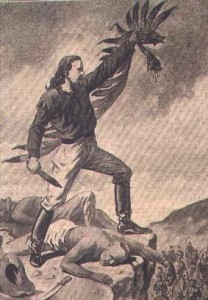
Buffalo Bill taking Yellow Hair’s scalp.
Cody took Yellow Hair’s scalp, war bonnet, shield, bridle, whip and weapons. He supposedly shouted “First scalp for Custer!” but that may have been added for the stage production of this event.
There were claims that someone else did it or that it never happened, but those claimants usually weren’t at the fight.
Q. Did your interest in Nebraskan and Western history develop because you have such deep roots in the state, and the region?
A. It certainly helped! It actually developed in a round-about way.
I have a group of friends with whom I wargame – reenacting battles on a tabletop with little lead soldiers. We became focused on the American Civil War and I had a great-great-grandfather who fought for the Union, so I became interested in visiting his forts and battlefields, as well as others back east.
When I ran out of those sites, and knowing many of those Civil War commanders came to the West, I began visiting what was in my own “backyard.” They’re much closer and just as fascinating.
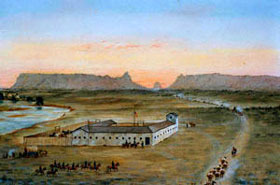
Fort Mitchell, by William Henry Jackson
Q. How did you learn enough to become a speaker?
A. I didn’t set out to be a speaker and I was a bit scared the first time out, but I knew the only way to sell books was to get out and talk about them. I’m a trivia nut and have a habit of picking up odd bits of info everywhere; I find that the things about history that have surprised and impress me do the same for people who come to my talks. I don’t use a script, so sometimes it’s really tough to keep them under 45 minutes!
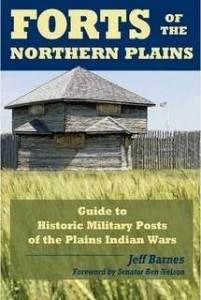
Q. How does it feel to be part of a place for five generations?
A. It’s a great feeling. I love Nebraska – our kids are within 15 minutes and have given us three seventh-generation Nebraskans.
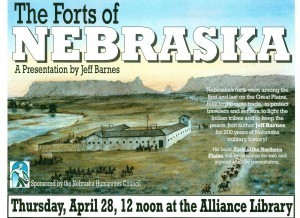 Q. Have you ever wanted to live anywhere besides Nebraska?
Q. Have you ever wanted to live anywhere besides Nebraska?A. I quit a radio DJ job after college to go hitchhiking to the Montana Rockies after reading Jack Kerouac and Steinbeck’s Travels with Charley. If the Great Falls Tribune had hired me I’d have stayed there, but Nebraska is my home.
Q. What are the five most interesting facts you’ve discovered when doing historical research?
A. Never thought about that, so I’ll just keep it local.
* That Custer had spent at least a day in my hometown of Omaha. I have a 1957 letter from NPS historian Merrill J. Mattes saying that Custer was never here, but my research of 1872 newspapers proves otherwise. I was also able to ID the place and date of a Custer photograph from that research.
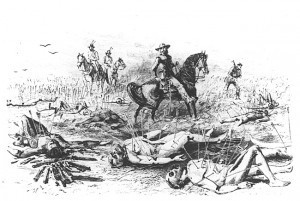
Custer and the Seventh Cavalry inspecting the remains of the Kidder Patrol, in Kansas.
* Omaha was a hotbed of military posts. From the first fort on the Great Plains (Fort Atkinson) to the last (Fort Crook), there were six military posts built within a 15-mile radius over 75 years.
* Custer’s “first stand” against Indians was in Nebraska on the Republican River. The date was June 24, 1867 – nine years and one day before his “last stand.”
* Buffalo Bill’s Medal of Honor was achieved here, about an hour north of North Platte on the South Loup River, near US 83. I’m now working with the state historical society to get the site marked.
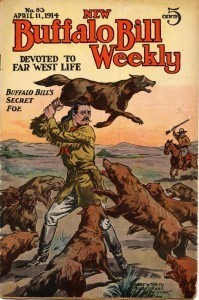
* That the birthplace of Buffalo Bill’s Wild West Show in Omaha was just a few blocks from MY birthplace. (Neither site is marked today.)
Q. Have your books sold well?
A. “Well” is a relative term, but for the niche I’ve carved out, it’s OK. Like anyone who has written a book, you wish it would sell more. Forts of the Northern Plains, my first, continues to sell in its sixth year – it’s now in its fourth printing. The Custer book is in its second printing after two years and the Buffalo Bill book has just been out three months.
Q. What are you working on now?
A. It’s a small book about a baseball field in Rushville, Nebraska, that served as baseball school and try-out camp for the Milwaukee Braves, the New York Yankees, and the Los Angeles Angels in the ‘50s and ‘60s. I was hired to write it, but it’s another one of those wonderful little hidden historical secrets about this state.
Jeff’s website is: http://www.northernforts.com 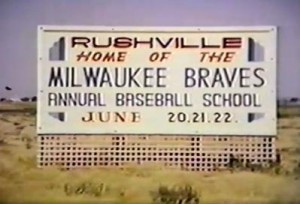
The post Jeff Barnes Says Custer Was Not A Bad General appeared first on Julia Robb, Novelist.
Published on June 01, 2014 06:26
No comments have been added yet.

